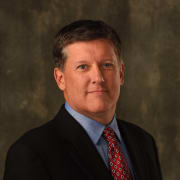'It's Messy': PGA of America CEO Hopes for Agreement Between PGA Tour and LIV Golf

LOUISVILLE, Ky. — The head of the PGA of America on Wednesday reiterated his desire to see golf come together with some resolution to the current PGA Tour/Public Investment impasse that continues to dominate discussion.
Seth Waugh, the CEO of the PGA—who also has a seat on the seven-member board of the Official World Golf Ranking—said on the eve of the PGA Championship that “I’m sort of hoping it’s the darkest before the dawn.’’
He also took issue with the timing of Jimmy Dunne’s resignation from the PGA Tour Policy Board, which was announced on Monday and noted that the PGA Championship “has the most flexibility of the majors’’ when it comes to inviting LIV Golf League players.
“It's messy and it seems to get messier every week,” Waugh said. “I think the best thing for the game is a deal. And we've been very consistent on that front.
“What has been an unsustainable business model has put pressure on other places like the Tour that creates some financial dynamics as well as other dynamics that are very hard, and quite frankly it puts some financial pressure on us, as well. I don't think the game is big enough for two tours like that, and I think we are diluting the game in a way that is not healthy.
“I hope there's a deal. I think both sides are not only committed to trying to find a deal but really need a deal, and in my history of deal making, when both sides kind of need something to happen, it generally does. I don't know the timing. I don't have any insider information that you all don't have. But I'm hopeful that there will be a deal over time.
“I hope there's urgency because I do think it's doing damage to the Tour, to the game. As I said earlier, I hope it's short-term damage, as opposed to permanent damage, and so I hope there's some urgency in the timing around it because I just don't think it's a healthy situation right now.”
The PGA of America has been lauded for inviting seven LIV players, with 16 total in the field. But both Waugh and Kerry Haigh, the PGA’s chief championships officer, said that was more a product of the tournament’s wide range of invitations it can extend.
“Our invitation process has been pretty much the same for many years,” Haigh said. “We have 15 criteria that are pretty much set, and then there’s an there's an opportunity for us to invite those players who may not be in those 15 criteria.
“We're fortunate in that case to be able to look at various tours, all tours, including LIV, world golf rankings, federation rankings, DP World Tour, New Zealand, Korn Ferry Tour, and from those identify what we think are the best players or potentially the best future players and offer them invitations.”
Talor Gooch, who was LIV’s leading player last year but has fallen outside of the top 600 in the OWGR, is the best example of a player who is being given credit for what he has done at the LIV Golf League. He got an invite along with four players who were among the top 100 in the world (Joaquin Niemann, Adrian Meronk, Lucas Herbert and Patrick Reed), another who won twice on the Asian Tour (David Puig) and one who won twice last year on the DP World Tour in South Africa (Dean Burmester).
The inability for LIV golfers to get OWGR points has led to the call for the majors to give direct spots to LIV players, something the others have so far resisted.
Mike Whan, CEO of the United States Golf Association, suggested recently the that USGA will have to look at it closer as it believed that the situation would be resolved with some sort of unification.
That alliance has become more unclear in the last week as Rory McIlroy’s desire to get back on the policy board as a player director was rebuffed and reports of differing views on whether or not the PGA Tour events wants a deal with the PIF continue to surface.
Last week McIlroy was appointed to a “transaction committee” that includes Tiger Woods and Adam Scott and that is to negotiate directly with the PIF. But McIlroy saw Dunne’s departure as a blow to the efforts.
“Honestly, I think it's a huge loss for the PGA Tour, if they are trying to get this deal done with the PIF and trying to unify the game,” McIlroy said. “Jimmy was basically the relationship, the sort of conduit between the PGA Tour and PIF. It's been really unfortunate that he has not been involved for the last few months, and I think part of the reason that everything is stalling at the minute is because of that. So it is, it's really, really disappointing, and I think the Tour is in a worse place because of it.
“I would say my confidence level on something getting done before last week was as low as it had been and then with this news of Jimmy resigning and knowing the relationship he has with the other side, and how much warmth there is from the other side, it's concerning.”
On Dunne, Waugh said: “Look, he's a very thoughtful guy and he's a grownup and he obviously has his own reasons for what he did. I wish his timing had been different than the Monday of our major.
“Look, they are going to have great candidates and I know they will get a great replacement for him. Wish him and them luck.”
As for his role with the OWGR and LIV’s lack of accreditation, Waugh gave a long answer, explaining that he didn’t believe LIV leadership knew or understood the process—“I’m not saying that’s their fault’’—and that it doesn’t take place quickly.
LIV first applied in July 2022 and throughout the process believed it should have been dealt with more quickly. Last October, the OWGR announced it was denying the bid, citing deficiencies in the LIV structure.
“There are two fundamental things that we weren't sure we could solve for with math, which was relegation and promotion, and what that looked like because that was murky … so we never knew the percentages of what that would look like.
“And secondly, just the inherent conflict of team versus individual play and whether that could create a situation, and it actually became public last year when one of the players (Sebastian Munoz at the LIV event in Orlando) talked about trying to two-putt as opposed to trying to make a putt to win a tournament. He was trying to two-putt for his team.
“So we went back with that and told them if they could solve that or we could engage on it. Kind of went back and forth a few times, but they didn't change their position. We didn't really change ours. We've had very serious conversations about it, and then without telling us publicly, they have withdrawn their application.
“So I don't think OWGR's job is to seek out tours to do that, and if they wanted to reapply, we'd certainly entertain it. We've behaved properly. Kerry sits on the technical committee that reviews all this stuff and we have behaved properly. It's very cordial. It's not a war. I don't want to pretend that. They were responsive, too, but they didn't get an answer that they wanted.
“So that's kind of where it is.”
